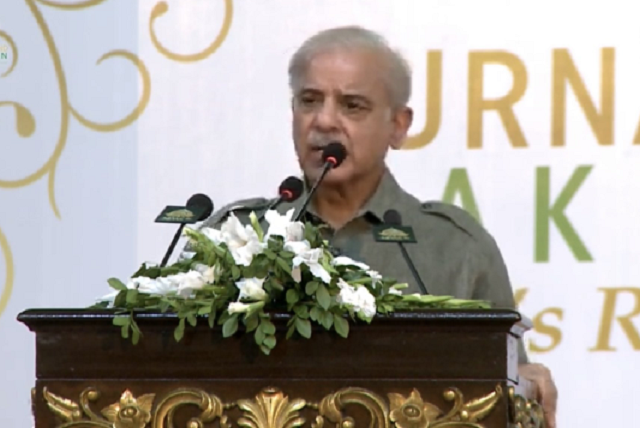Premier stresses need for all quarters to work together for country’s progress as well as need for self-reliance

ISLAMABAD: Prime Minister Shehbaz Sharif on Tuesday promised to bring durable economic stability in his tenure on the back of increase in agriculture productivity and exports but said that political stability was a prerequisite for this to happen.
While inaugurating the Turnaround Pakistan conference, attended by people from all walks of life to suggest out of the box economic solutions, the premier regretted that after 75 years of independence, the country’s balance sheet had more liabilities than assets.
PM Shehbaz went on to say that Pakistan was facing countless issues as he called for rising above personal interests and differences.
“Every new government blames the previous government but we now need to decide on changing the country’s fate and for that we need to work day and night,” he added.
The premier stressed the need for all quarters to work together for the country’s progress as well as the need for self-reliance.
“Self-reliance guarantees political and economic independence.”
The premier also vowed that he would end “red-tapism” and the need for seeking permission for doing business within a month — a goal that seems challenging.
He emphasised the need for self-reliance instead of relying on the International Monetary Fund (IMF) while citing Bangladesh as an example that completed a $6 billion infrastructure project without any loan from the Washington-based lender or the World Bank.
Also read: Pakistan could receive up to $2b from IMF, says PM Shehbaz
He cited the example of Reko Diq, saying Pakistan had wasted billions but had yet to earn anything from the project.
The premier said the country was drowning under debt.
He regretted that the 1,200 MW Haveli Bahadur Shah Power Plant, set up by the former PML-N government, had still not been completed.
Pakistan’s economy is marred by not only lower exports but also recurrent fiscal and current account deficits along with below-average social indicators.
In this backdrop, it is absolutely necessary for the government to take necessary steps urgently to increase the country’s national exports.
Speaking on the occasion, Planning Minister Ahsan Iqbal said Pakistan was on path of becoming the 25th top economy of the world but the progress was halted in 2018 after the new government changed the economic policies.
He added that he felt ashamed where the country was standing after 75 years of independence but vowed to change the course.
The minister emphasised the need to earn dollars through exports. “The exports and the foreign remittances are barely enough to bridge the yawning trade deficit.”
The Turnaround programme that Ahsan unveiled was the replica of his Vision 2025 document, launched eight years ago. However, this time, the government has not labeled it as the Vision 2025 document. The planning minister said the reason behind this was not to give any new government a reason to drop the plan.
Various thematic groups gave recommendations to change the economic course that has resulted in unsustainable fiscal and current account deficits.
The export-led growth group emphasised the need to have consensus on the economic roadmap by at least nine parties that were part of the coalition government.
It has been recommended to sign well-negotiated free trade agreements (FTAs) with developing countries, especially countries in Africa, Central Asia and Southeast Asia. Moreover, the existing FTAs need substantial revision in line with Pakistan’s comparative and absolute advantages.
The government has also been advised to make productivity central to achieve an increase in exports. The commodity producing sector of Pakistan’s economy needs to enhance its productivity and efficiency as currently it is operating at its lowest level. Increase in productivity would help the economy become competitive internationally, according to the recommendation.
It has also been proposed that streamlining and rationalisation of regulations and development of brands has been termed essential for Pakistan’s exports to grow.
The establishment of the EXIM (Export and Import) bank for providing financing to manufacturers to expand export base has also been proposed.
One group has recommended the reduction of the super tax imposed on the corporate sector. It argued that the corporate sector was already pay multiple taxes and contributing to the growth of Pakistan.
It has also been advised that instead of focusing on import substitution there is a need to focus on increasing value added exports. The need to increase agricultural productivity to avoid food insecurity and save foreign exchange was also emphasised.
The information technology exports need to be increased by skill development and formalising and channelising the existing exports by incentivising the sector.
Also read: MNAs show optimistism about economic turnaround
For attracting foreign direct investment, there is a need to invest in human resource development, policy consistency for longer period of time and improvement in ease of doing business.
The resource mobilisation group has recommended rationalisation of expenditures along with increasing revenue by lowering sales tax and increasing tax base.
To avoid misuse and tax evasion, agriculture, services and wholesale and retail trade need to be brought under tax net, according to the recommendation. There should be a single tax agency to avoid inefficiencies.
Courtesy : Express Tribune